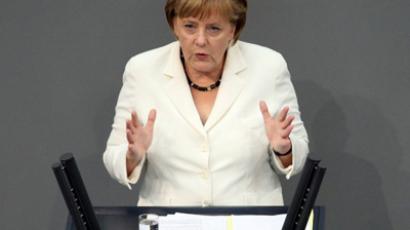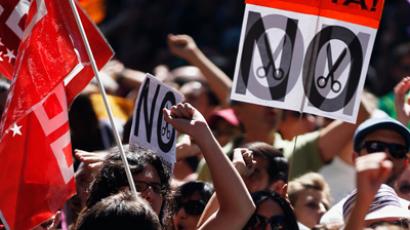'Summit in Brussels is going to solve absolutely nothing'
As anti-austerity strikes and demonstrations are gripping the worst hit EU countries another summit takes place in Brussels. However, EU summits do not give answers to real economic problems, Jerome Roos, a debt crisis researcher, told RT.
“There’s one thing that we’ve learned over the last couple of years. It’s when European leaders say something about the crisis they usually mean the exact opposite. And when they are saying that the end of the crisis is in sight, it probably means that Spain and Greece are slipping into depression,” said Jerome Roos, a researcher from the European University Institute in Florence.On Thursday hundreds of youths took to the streets during Greece’s second general strike in a month. Workers across the country walked off the job to protest the new austerity measures the government is negotiating with Greece's international creditors. “The crisis is spinning out of control, things are getting worse and this summit in Brussels is going to solve absolutely nothing,” Roos added.Crisis-stricken Greece is surviving with the help of two massive international bailouts worth a total €240bln ($315bln). To secure them, it has committed to drastic spending cuts, tax hikes and reforms, all with the aim of getting the state coffers back under some sort of control. A new austerity package discussed by Greece’s four-month-old coalition government and debt inspectors from the EU, International Monetary Fund and European Central Bank aims to save €11bln ($14.4bln) in spending, which should come largely come from pensions and health care. Another €2.5bln ($3.3bln) is planned to be raised through taxes. While significantly reducing the country's annual borrowing, the measures have made the recession worse. By the end of next year, the Greek economy is expected to be around a quarter of the size it was in 2008. And with one in four workers out of a job, Greece has, along with Spain, the highest unemployment rate in the 27-nation European Union. “We are sinking in a swamp of recession and it's getting worse,” said Dimitris Asimakopoulos, head of the GSEVEE small business and industry association. “180,000 businesses are on the brink and 70,000 of them are expected to close in the next few months.”The idea to set up banking and a fiscal unions are also set to fail, Jerome Roos went on criticizing. The main reason is that it’s politically impossible to sell this type of union. Creating such unions would “basically mean that the taxpayers of the north will be held liable for the banking sector in the south,” Roos explained.“If such a union comes into existence, it would be built upon a series of conditions that would be extremely penalizing and punitive for the periphery countries. And would actually be not a fiscal and not a banking union, but an austerity union that would perpetuate the type of measures that we see today and institutionalize the money at European level,” the expert concluded.














